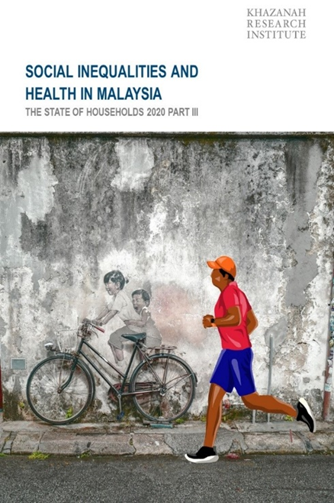Article Search: Pn. Balqis Binti Md Ruslan
Article By: Khazanah Research Institute
Source: https://www.krinstitute.org/assets/contentMS/img/template/editor/KRI%20-%20Siaran%20Media%20Social%20Inequalities%20latest.pdf

Malaysia’s overall health has experienced laudable improvements over the last decades, but the gains in health outcomes are unevenly spread across the population, according to Khazanah Research Institute’s (KRI) latest publication, Social Inequalities and Health in Malaysia, released today.
Malaysians are now living longer as illustrated by rising life expectancies. A male and female newborn in 2020 can expect to live to the age of 72.6 and 77.6 years, respectively, about 11 years longer compared to newborns in 1970. The increase in life expectancy seen in Malaysia is largely the result of decreases in child and maternal mortality. For example, the number of deaths among infants aged less than 28 days (neonatal mortality rate) in 2019 stood at 4.1 deaths per 1,000 live births, compared to 21.4 in 1970. The number of maternal deaths also greatly declined from 140.8 deaths per 100,000 live births in 1970 to 21.1 in 2019.
Living Longer but Not Necessarily Healthier
The report states that life expectancy alone is not an adequate measure of population health; many Malaysians experience debilitating health conditions such as heart diseases, back pain, and mental ill health, especially in their later years. Thus, discussions on health must be expanded beyond the length of years lived to how much of those years are lived in good health. To account for years lived in illness and disability, the report uses the healthy life expectancy (HALE) indicator, which is the average number of years a person can expect to live in good health. An average person’s healthy life expectancy in 2019 was 65.5 years. This means that although a baby born in 2019 could expect to live up to 75.0 years, 9.5 of those years would be spent in poor health.
Additionally, the report notes that the additional life years gained over the decades are not equally enjoyed across the population. For instance, a male newborn in Sarawak or Kuala Lumpur in 2020 is expected to live to about 74 years, whereas a male newborn in Perlis, Terengganu or Kelantan is only expected to live up to 69 years, i.e. a gap of 5 years. Moreover, international comparisons with countries at similar levels of development indicate that there is still room for improvement. Despite Malaysia starting off with a similar level of life expectancy as Mexico, and higher than Turkey and Thailand in 1990, these countries have overtaken us in the last three decades and recording higher life expectancies in 2019.
Poor And Poor Health
Aside from differences in health outcomes by gender, ethnicity and state, the report’s findings show health inequalities between income and occupation groups, highlighting the significant role such social factors play in shaping health outcomes.
Evidently, health status is inversely associated with socioeconomic status. Poor health was found to be more prevalent among lower income groups. In 2015, the percentage of adults with high blood pressure was highest among adults in bottom 20% households (B20) at 38.3% and lowest in top 20% households (T20) at 27.1%. This situation is observed in the prevalence of mental health problems among adults and children as well. 33.6% of adults and 13.9% of children in the B20 group had some mental health problems, compared to just 26.4% of adults and 8.0% of children in the T20 group.
Work And Physical and Mental Health
Work can be health-enhancing as it provides an important source of income, which can be used to improve health in several ways including purchasing health-promoting goods and services. However, work can also negatively impact health by exposing workers to physical and chemical hazards as well as psychosocial hazards including stress due to excessive work demand and other conditions over which they have little control.
A high proportion of the Malaysian working age population have health conditions. For example, in 2019, unpaid workers/home makers had the highest prevalence of high blood pressure (34.7%) compared to other occupational groups (government/semi-government employees at 29.4%; private sector employees at 18.8%; self-employed persons at 30.7%). Meanwhile, the link between work and mental health should not be left unchecked. In 2015, approximately one in three private sector employees, self-employed and unpaid workers/home makers had mental health problems, with the prevalence slightly lower amongst government/semi-government employees at approximately one in four workers.
Improving Health for All
The report acknowledges that, while overall access to healthcare in Malaysia is relatively high, access alone does not ensure good health for all. Rather, health outcomes are due to a mix of factors including income and working environments. When these determinants are unevenly distributed in society, this contributes to health inequalities within the population. Thus, public policies play an important role to reduce these health inequalities.
The authors conclude that to improve health for all and eliminate health gaps, policies must go beyond addressing the determinants that directly affect health, and place greater importance on the social mechanisms underlying the inequitable distribution of health.
More specifically, Malaysia must consider adopting an intersectoral approach in tackling any issue such as eliminating barriers to education, initiating social protection schemes for neglected populations, and improving housing conditions. In designing national policies for improving the overall wellbeing of the nation—whether it be urban, educational, or industrial planning—they should not be divorced from the potential impact on health.
Date of Input: 28/12/2023 | Updated: 28/12/2023 | muhammad.isam
MEDIA SHARING































